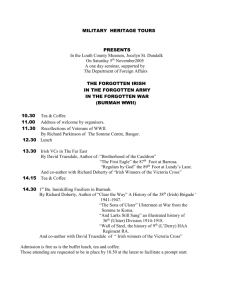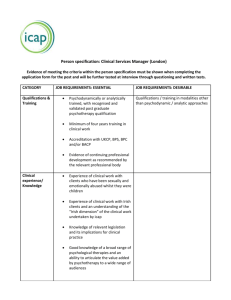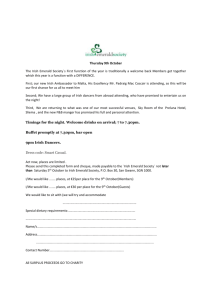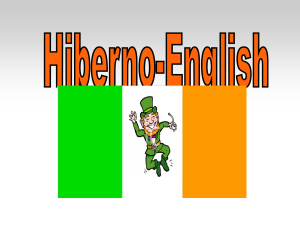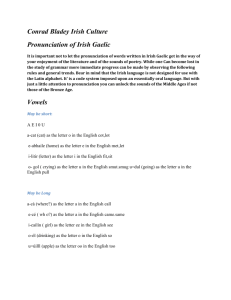A Pronunciation Guide to Ulster Irish
advertisement
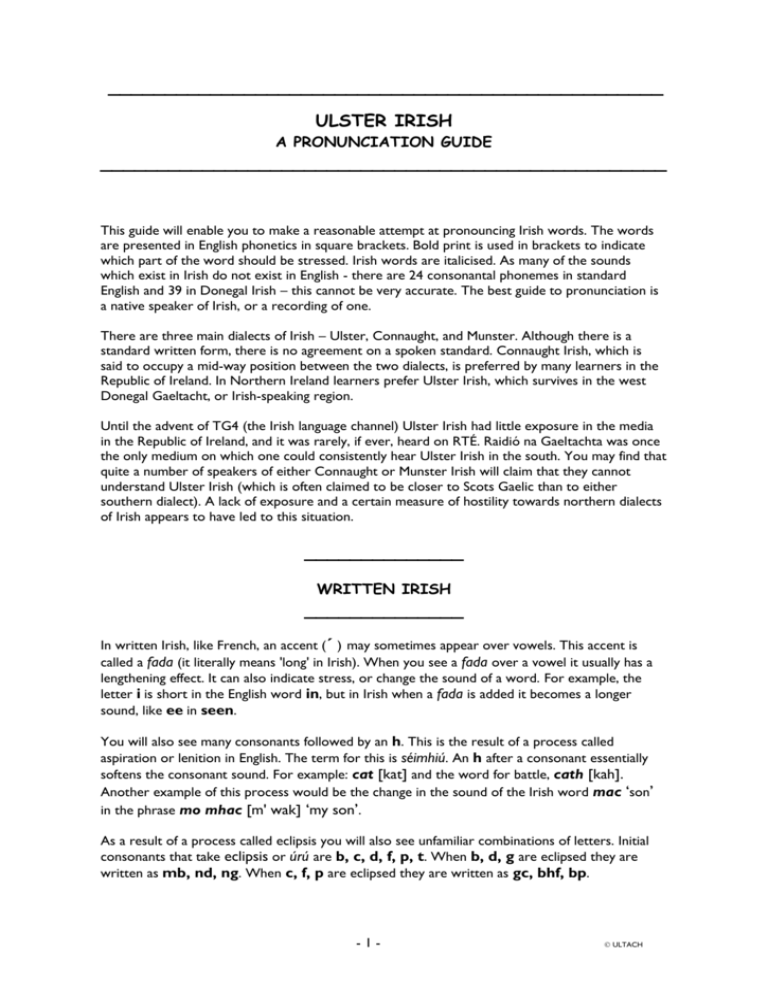
_________________________________________________ ULSTER IRISH A PRONUNCIATION GUIDE __________________________________________________ This guide will enable you to make a reasonable attempt at pronouncing Irish words. The words are presented in English phonetics in square brackets. Bold print is used in brackets to indicate which part of the word should be stressed. Irish words are italicised. As many of the sounds which exist in Irish do not exist in English - there are 24 consonantal phonemes in standard English and 39 in Donegal Irish – this cannot be very accurate. The best guide to pronunciation is a native speaker of Irish, or a recording of one. There are three main dialects of Irish – Ulster, Connaught, and Munster. Although there is a standard written form, there is no agreement on a spoken standard. Connaught Irish, which is said to occupy a mid-way position between the two dialects, is preferred by many learners in the Republic of Ireland. In Northern Ireland learners prefer Ulster Irish, which survives in the west Donegal Gaeltacht, or Irish-speaking region. Until the advent of TG4 (the Irish language channel) Ulster Irish had little exposure in the media in the Republic of Ireland, and it was rarely, if ever, heard on RTÉ. Raidió na Gaeltachta was once the only medium on which one could consistently hear Ulster Irish in the south. You may find that quite a number of speakers of either Connaught or Munster Irish will claim that they cannot understand Ulster Irish (which is often claimed to be closer to Scots Gaelic than to either southern dialect). A lack of exposure and a certain measure of hostility towards northern dialects of Irish appears to have led to this situation. ______________ WRITTEN IRISH ______________ In written Irish, like French, an accent (´ ) may sometimes appear over vowels. This accent is called a fada (it literally means 'long' in Irish). When you see a fada over a vowel it usually has a lengthening effect. It can also indicate stress, or change the sound of a word. For example, the letter i is short in the English word in, but in Irish when a fada is added it becomes a longer sound, like ee in seen. You will also see many consonants followed by an h. This is the result of a process called aspiration or lenition in English. The term for this is séimhiú. An h after a consonant essentially softens the consonant sound. For example: cat [kat] and the word for battle, cath [kah]. Another example of this process would be the change in the sound of the Irish word mac ‘son’ in the phrase mo mhac [m' wak] ‘my son’. As a result of a process called eclipsis you will also see unfamiliar combinations of letters. Initial consonants that take eclipsis or úrú are b, c, d, f, p, t. When b, d, g are eclipsed they are written as mb, nd, ng. When c, f, p are eclipsed they are written as gc, bhf, bp. -1- ULTACH You will also see that vowels are sometimes eclipsed. When a, e, i, o, u are eclipsed they are prefixed by an n. If a prefixed word is a lower capital a hyphen appears between the n and the vowel (n-). A hyphen is not used with vowels in upper capitals. ______________ VOWELS ______________ In Irish there are five long and five short vowels. The long vowels are í, é, á, ó, ú. The short vowels are i, e, a, o, u. The vowels i and e are slender. They are some times followed by a [y] sound to enable the speaker to pronounce the following sounds more easily. The consonants beside them are said to be slender. The vowels a, o, u are broad and do not affect the consonants around them in the same way. They are often followed by a [w] sound and the consonants around them are referred to as broad also. LONG VOWELS Element Irish word and [phonetic English version] English word Á slán [slaan] goodbye É Éire [ayrheh] Ireland Í buí [bwee] yellow Ó srón [srone] with n, nn, ng, m, mh ó sounds like the 'o' in the word more tóg [taug] with all other consonants ó sound like 'aw' in the word shawl Note: The ó sound in srón is used for every ó in Southern dialects Ú dún [doon] nose lift, take fort -2- ULTACH SHORT VOWELS Element Irish word and [phonetic English version] English word A bean [ban] woman E te [tcheh] hot I fios [fiss] knowledge, to know O obair [ubirh] work U dubh [dooh] black Vowel combinations are pronounced as follows (only the most common are included): SHORT VOWEL COMBINATIONS Element AI Irish word and [phonetic English version] bain [bwinh] English word reap, cut ai sound like 'i' in win EA fear [farh] man ea sound like 'a' in man. Ulster learners note: do not lengthen the 'r' at the end of words like fear unless they end in two 'r's e.g. fearr [farr] better EI seirbhís [sherhvish] service ei is like the 'e' in ferry EO deoch [joch] drink eo is like the 'o' in shock. The 'ch' is pronounced as in loch in Scotland -3- ULTACH IO mionteanga [mintchanga] minority language in io the 'i' is pronounced UI suim [sim] interest the i is pronounced LONG VOWEL COMBINATIONS Element AE English word Irish word and [phonetic English version] tae [tay] tea ae sound like 'ai' in pain Note: AO Although e is a slender vowel in Irish, the combination ae is broad, hence the spelling of Gaeilge a haon [a heen] one (counting) ao sounds like 'ee' in see UA suas [sooas] up ua is a diphthong, a combination of more than one vowel sound -4- ULTACH ______________ THE EPENTHETIC VOWEL ______________ In Ireland many people insert an extra vowel between i and m in the word film, so that the sound varies between [filum] and [filim]. The most common term for this is the epenthetic vowel. It appears when l, n, and r are followed by m (+mh), g, ch, and b (+bh) (n+g are an exception). Here are some examples: EPENTHETIC VOWEL Irish word and [phonetic English version] English word ainm [anyim] name dearg [jyarug] red gorm [gorum] blue Albain [alabwin] Scotland borb [borub] rude seanchaí [shanachee ] storyteller ainmhí [anavee ] animal Donnchadh [donnachoo] personal name balbh [baluv] deaf -5- ULTACH ______________ CONSONANTS ______________ In Irish when consonants and either broad or slender vowels come together they affect the sound of the word. Therefore, slender vowels appear with slender consonants and broad vowels appear with broad consonants. The following table presents examples of both slender and broad consonants and the accompanying vowel. VOWEL/CONSONANT COMBINATIONS Element B broad Irish word and [phonetic English version] bád [bwad] English word boat lips very slack, almost like 'bw' B slender bean [ban] woman similar to English 'b' but the lips are tighter C broad cailín [kaleen] girl like 'k' but with your tongue further back in the mouth C slender ceart [kyart] right, correct not in standard English. A 'ky' sound with the tongue well forward D broad doras [dorus] door like English 'd' in Dan, but a broader sound. Make the tip of your tongue touch the back of your teeth D slender Dia [jeeah] God similar to English 'j'. The front of the tongue touches the ridge of flesh just behind the teeth -6- ULTACH F broad fás [fwas] grow lips are very slack, almost like 'fw'. This 'f' used to be bilabial, that is the sound was made with the lips alone. However most Irish speakers touch their lips with their teeth now as in English 'f' F slender man fear [far] lips very tight, rather like 'f' in five G broad soft bog [bug] similar to English 'g' in got, but draw your tongue very far back in the mouth G slender geal [gyal] bright almost like 'gy' in American English gal. Keep the tongue well forward and pronounce quickly L broad balla [bwalla] wall similar to English 'l' in 'loaf'. Spread the tongue over the back part of the upper teeth. L slender gleann [glyann] valley 'ly' sound, like 'l' in value or million M broad máthair [mahirh] mother similar to English 'm', lip slacker almost like 'mw' M slender mise [mishuh] me similar to English 'm' but with lips tighter N broad gan [ganh] without similar to English 'n' in fun -7- ULTACH N slender bainne [banyeh] milk like 'n' in new or senior P broad Pádraig [pwadrig] Patrick lips slack, sometimes like 'pw' P slender píopa [peepuh] pipe lips very tight, pronounce quickly R broad carr [karr] car like English 'r' in run but broader Note: R slender Initial 'r' is nearly always broad. The letters s + r are always broad when they appear together in Ulster Irish, except with slender t: girseach [girsah] not [girhshah] girl tuirseach [tursah] not [turhshah], but tired Béal Feirste [bell farhshtcheh] Belfast obair [obirh] work impossible to describe. Like a combination of 'th' and 'r'. with air released afterwards. Push the tip of your tongue slightly forward from the English 'r'. S broad seas [shas] stand like English 'sh' Note: in s plus slender m, b, p, or r combinations the s is always broad: spéir [speyrh] not [shpeyrh] sky In s plus slender t or c combinations the s is slender: story scéal [shkial] -8- ULTACH T broad cat [kat] cat like English 't' in too, but broader. Press the tongue against the upper teeth T slender te [tcheh] hot almost like a 'tch' sound, as in 'tune'. The front of the tongue touches the ridge of flesh just behind the teeth Note: when slender t and d come together, they are pronounced as slender t: druidte [drhijheh] not [drhijtcheh] closed inchreidte [inchrhejheh] not [inchrhejtcheh] believable goidte stolen [gijheh] not [gijtcheh] -9- ULTACH ASPIRATED CONSONANTS ______________ Aspiration or lenition takes the form of an h when it is written. When an aspirated consonant is pronounced it has the effect of lightening or softening the consonant. For example the clear, crisp sound of c (as in the English cut) becomes ch (as in the Scottish loch) when aspirated. When consonants are aspirated in the middle, or at the end, of words they are often not sounded at all. This process originally occurred when a consonant was between two vowels; an example of this in other languages is the change in sound from Latin liber 'book' to French livre or Irish leabhar [lore]. ASPIRATED CONSONANTS Element BH broad Irish word and [phonetic English version] mo mhála [m' wala] English word my bag lips very slack When bh and mh occur at the end of a word an 'oo' sound is produced: BH slender folamh [folloo] empty saibhir [sevirh] rich like English 'v' CH broad ach [ach] but not in English. As in loch as usually pronounced in Scotland Note: at the end of a word consisting of more than one syllable ch is often weakened to an h sound in Ulster Irish: tomorrow amárach [amarah] CH slender initial as in German ich. This sound is halfway between broad ch and an h sound fiche [fiche] twenty - 10 - ULTACH DH broad initial do dhoras [d’ dhoras] your door not in English, a guttural sound at the back of the throat DH broad middle bodhar [bore] deaf In the middle of a word dh is silent and it tends to make the vowel long DH broad final geimhreadh [givroo] winter dh produces an 'oo' sound as in English do when it appears at the end of a word DH slender initial do dheontas [d’ yowntas] your grant when dh appears in the middle of a word it is silent and it tends to make the vowel long DH slender final tinidh [tchinee] when dh appears at the end of a word as the ending -idh, it produces an 'ee' sound, like the English feel FH initial an fhuinneog [un inyaug] fire (Ulster Irish variant of standard form tine) the window when f is followed by h it is silent GH slender middle maighdean [maijan] maiden when gh appears in the middle of a word it is silent and it tends to make the vowel long PH initial do pheata [d’ fata] your pet When p is followed by h it sounds like f - 11 - ULTACH SH initial when s is followed by h it is usually silent almost like the h in how: a sheal [a hal] Note: TH initial his turn when sh is followed by á, ó, ú, it sounds like the h in Huey or Hubert or slender ch: shiúil mé [chool m’] I walked tráthnóna [trahnona] afternoon when t is followed by h it sounds like h in how ______________ ECLIPSIS ______________ The following examples illustrate what happens when eclipsis occurs: ECLIPSIS Element B mB C gC D nD G nG Irish word and [phonetic English version] English word Béal Feirste [bell farshtcheh] Belfast i mBéal Feirste [i mell farshtcheh] in Belfast Corcaigh [corrkee] Cork i gCorcaigh [i gorrkee] in Cork Dún na nGall [doon na ngall] Donegal i nDún na nGall [i noon na ngall] in Donegal Gaillimh [gallyiv] Galway i nGaillimh [i ngallyiv]– like ng in sing in Galway - 12 - ULTACH P bP T dT A n-a E n-e I n-i O n-o U n-u Páras [paarus] Paris i bPáras [i baarus] in Paris Tír Eoghain [cheerh owin] Tyrone i dTír Eoghain [i jeerh owin] in Tyrone aonad [aynud] unit ár n-aonad [aar naynud] our unit eolas [awlis] information ár n-eolas [aar nawlis] our information iarracht [eeracht] attempt/effort ár n-iarracht [aar neeracht] our attempt/effort oifig [offig] office ár n-oifig [aar noffig] our office uimhir [ivirh] number ár n-uimhir [aar nivirh] our number You will also see the construction ts which is not a case of eclipsis: Element T ts Irish word and [phonetic English version] sa tsiopa [sa tchopah] English word in the shop - 13 - ULTACH N R You will also notice that in Ulster Irish the letter n is pronounced as an r after the letter c, g and t. N to R Element n to r English word Irish word and [phonetic English version] cnoc [kruck] a hill gnó [groe] business tnúth [trooh]] expectation ____________________________________ DIALECTS WITHIN ULSTER IRISH ____________________________________ The largest area where Ulster Irish is spoken is in north-west Donegal. Here, you will notice that a sounds something like the ay in 'day': sásta [saysta] happy bád [bwayd] boat There are two distinctive features of the Irish spoken in the Gaoth Dobhair area: slender r sounds like 'ee' in 'see', and cht becomes [rt]: Gaoth Dobhair [g' dowee] Gweedore máthair [mahee] mother ocht [ort] eight iascaireacht [eeskeeyart] fishing None of the above features are found in south Donegal Irish or the Irish spoken by learners in Northern Ireland. - 14 - ULTACH Apart from the above, there are other differences between the Irish of Donegal and Northern Ireland. Learners of Irish in Northern Ireland are influenced by standard Irish, both written and spoken. For example, many learners use standard versions of words which are not used in the Gaeltacht areas of Donegal: N. I. version cistin [kishtchin] kitchen Donegal version cistineach [kishtchinyah] kitchen N. I. version gafa [gafa] occupied Donegal version gaibhte [gutcheh] occupied Although learners have a tendency to use a Donegal vocabulary, they may pronounce this vocabulary as it is spelt, rather than how it is pronounced in Donegal. For example, the standard Irish word for rotten is lofa, but the more common pronunciation in Donegal is [lo-ha]; learners pronounce the word as [lofa]. ____________________________________ WORD STRESS ____________________________________ When pronouncing Ulster Irish you almost always stress the first part of the word, even if the second part has a long vowel. For example: Donegal version bradán [bradan] salmon Munster version bradán [bradawn] salmon Donegal version Seán [shan] Sean / Shane Munster version Seán [shaun] Sean / Shaun - 15 - ULTACH There are some exceptions to this general pronunciation rule. They occur with adverbs which were historically composed of two words and place names which combine two words. For example: Béal Feirste [bel farshtcheh] Belfast anois [ah-nish] now arís [ah-rheesh] again ansin [an-shin] there anseo [an-shauh] here Sandhi Sandhi occurs when pairs of consonants from the group d, n, t, l, s and r which are homorganic (produced in the same part of the mouth) come together, often at the end of a word and the start of another. Sandhi is the process by which they influence one another, enabling speech without a pause; an example is the pronunciation of French les amis as [lezami]. This often results in the broadening or slenderising of the affected consonants: expected becomes meaning cuid de [kwij je] [kwid de] the prepositions de and do are confused in Ulster Irish, and are both pronounced as do. The broad d of de broadens the d in cuid. part of mo chuid lámh [m’ chwij lau] [m’ chwid lau] my (share of) hands dúirt tú [doortch too] [doort too] you said dhruid tú [dhrij too] [dhrid too] you closed bhriseadh sé [vrhishadh shay] [vrhishitch shay] - 16 - he would break ULTACH

